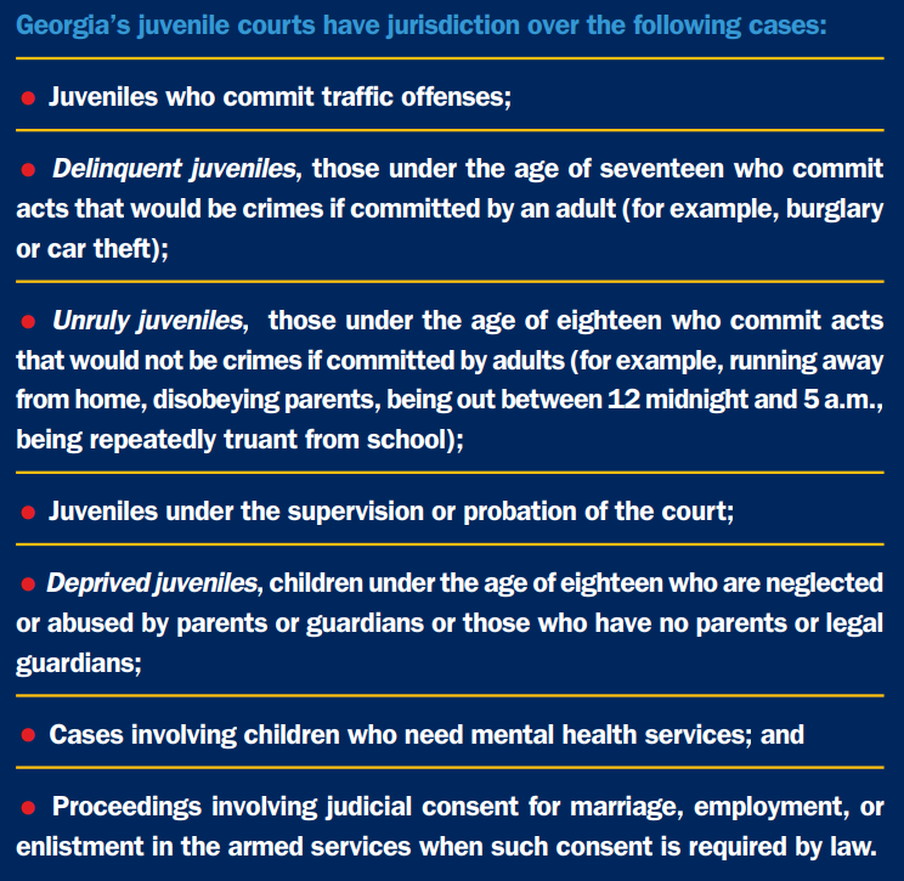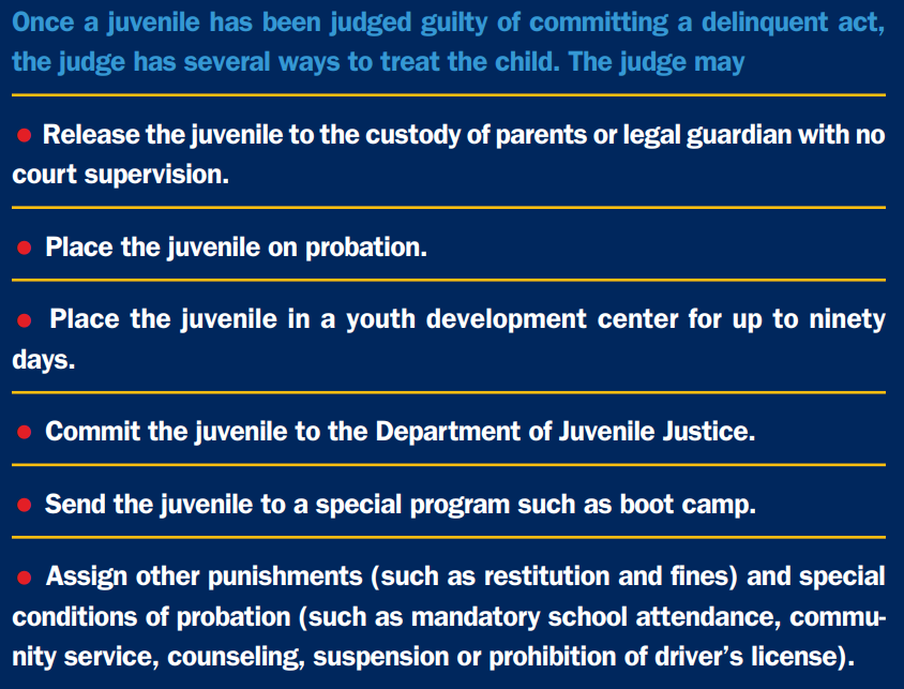The Juvenile Justice System
SS8CG5- Explain how the Georgia court system treats juvenile offenders.
A. Explain the difference between delinquent and unruly behavior and the consequences of each.
B. Describe the rights of juveniles involved in the juvenile justice system.
C. Explain the steps in the juvenile justice system when a juvenile is first taken into custody
A. Explain the difference between delinquent and unruly behavior and the consequences of each.
B. Describe the rights of juveniles involved in the juvenile justice system.
C. Explain the steps in the juvenile justice system when a juvenile is first taken into custody
Jurisdiction of the Juvenile Justice System
Rights of Juveniles
Like adults, juveniles have rights when they are charged with a crime in Georgia.
Minors in the juvenile justice system have some additional protections.
- Although not required by Georgia law, it is desirable for parents, a legal guardian, or an attorney to be present when a youth is questioned by the police or anyone else.
- The Georgia Supreme Court has held that parents should be present when a child waives their Fifth Amendment privileges.
- The rules for deciding if a confession can be used against a defendant in court are stricter for juveniles than for adults in Georgia.
- You have the right to enter a plea of not guilty.
- You have the right to an attorney throughout all trial proceedings.
- If you cannot afford an attorney, you have the right to ask the court to appoint one at no cost to you.
- You have the right to be presumed innocent throughout the court proceedings unless you are found guilty beyond a reasonable doubt.
- You have the right to present evidence in your own defense.
- You have the right to confront witnesses who testify against you at trial.
- You have the right to remain silent at trial or testify in your own defense. Silence cannot be used against you.
- If you are found guilty at trial, you have the right to appeal.
Minors in the juvenile justice system have some additional protections.
- Although not required by Georgia law, it is desirable for parents, a legal guardian, or an attorney to be present when a youth is questioned by the police or anyone else.
- The Georgia Supreme Court has held that parents should be present when a child waives their Fifth Amendment privileges.
- The rules for deciding if a confession can be used against a defendant in court are stricter for juveniles than for adults in Georgia.
- A court considers whether the juvenile waived their rights knowingly and voluntarily.
- It takes into account factors such as the juvenile's age, education, and their understanding of the meaning of their rights.
- Interrogation methods and whether the juvenile was allowed to consult with an adult would also be considered.
Steps in Juvenile Justice System
1. Robb is 14 and is caught trespassing inside a school on a Saturday with his friends
2. Robb is taken into custody (detained) by police
3. Police notify Robb’s parents and depending on the delinquent act Robb is either released back to his parents or detained in a Youth Detention Center
4. If detained, Robb is in detention and goes to a probable cause hearing in front of a judge Robb is then either
A) released,
B) has an informal adjustment, or
C) a formal hearing.
GENERALLY, AN INFORMAL ADJUSTMENT IS HELD FOR 1ST TIME OFFENDERS – THIS INCLUDES COUNSELING OR COMMUNITY SERVICE AND/OR PAYING FOR DAMAGES OR A FINE
5. If the judge says Robb must go to a formal hearing then the complaining witness (private citizen or police officer) files a petition outlining the wrongdoing
6. A summons is issued for Robb, his parents, and the witness(es) to attend the formal hearing
7. The 1st hearing is called an adjudicatory hearing, kind of like a trial but without a jury
8. The judge hears both sides of the case and evidence and decides if Robb is guilty
9. If guilty, the court schedules a second hearing called a dispositional hearing. In the dispositional hearing the judge determines the punishment for the offense
10. Robb is then sentenced: either put on probation and counseling; pay for damages or a fine; community service work; suspension of driver’s license; put in a Youth Detention Center for up to five years; put into a special boot camp
11. The final step in the process is that Robb can appeal his case
2. Robb is taken into custody (detained) by police
3. Police notify Robb’s parents and depending on the delinquent act Robb is either released back to his parents or detained in a Youth Detention Center
4. If detained, Robb is in detention and goes to a probable cause hearing in front of a judge Robb is then either
A) released,
B) has an informal adjustment, or
C) a formal hearing.
GENERALLY, AN INFORMAL ADJUSTMENT IS HELD FOR 1ST TIME OFFENDERS – THIS INCLUDES COUNSELING OR COMMUNITY SERVICE AND/OR PAYING FOR DAMAGES OR A FINE
5. If the judge says Robb must go to a formal hearing then the complaining witness (private citizen or police officer) files a petition outlining the wrongdoing
6. A summons is issued for Robb, his parents, and the witness(es) to attend the formal hearing
7. The 1st hearing is called an adjudicatory hearing, kind of like a trial but without a jury
8. The judge hears both sides of the case and evidence and decides if Robb is guilty
9. If guilty, the court schedules a second hearing called a dispositional hearing. In the dispositional hearing the judge determines the punishment for the offense
10. Robb is then sentenced: either put on probation and counseling; pay for damages or a fine; community service work; suspension of driver’s license; put in a Youth Detention Center for up to five years; put into a special boot camp
11. The final step in the process is that Robb can appeal his case


